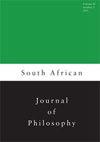遗憾的经历和对人生的肯定
IF 0.2
3区 哲学
0 PHILOSOPHY
引用次数: 0
摘要
摘要本文的主题是探讨不幸和其他令人遗憾的场合与对生命的肯定的关系。R. Jay Wallace认为,在我们的肯定态度和我们的理性和经过深思熟虑的判断之间存在一种对立关系,这种关系导致了分裂。在他看来,我们对赋予我们生命意义的人和事的依恋使我们肯定了一些更应该后悔的事情。我认为,肯定的态度可以承认并公正地对待后悔的原因。华莱士没有领会尼采观点的含义,他引用尼采的观点作为先例;他认为过去的意义是固定的,与未来隔绝的。借鉴尼采,我认为,生命的肯定是一个连贯的工程,赋予意义的历史序列,向前进入未来。本文章由计算机程序翻译,如有差异,请以英文原文为准。
Regrettable experiences and the affirmation of life
AbstractMy theme in this essay is the relation of misfortune – and other occasions for regret – to the affirmation of life. R. Jay Wallace believes there is an antagonistic relation that produces a schism between our affirmative attitudes and our reasons and considered judgments. On his view, our attachments to the persons and projects that give meaning to our lives lead us to affirm states of affairs it would be more appropriate to regret. I argue that the attitude of affirmation can acknowledge and do justice to reasons for regret. Wallace fails to appreciate the implications of the Nietzschean positions he cites as precedents; he assumes the past has a meaning that is fixed and insulated from the future. Drawing on Nietzsche, I argue that the affirmation of life is a coherent project of bestowing meaning on a historical sequence going forward into the future.
求助全文
通过发布文献求助,成功后即可免费获取论文全文。
去求助
来源期刊

SOUTH AFRICAN JOURNAL OF PHILOSOPHY
PHILOSOPHY-
CiteScore
1.00
自引率
0.00%
发文量
19
期刊介绍:
The South African Journal of Philosophy (SAJP) is the official publication of the Philosophical Society of South Africa. The aim of the journal is to publish original scholarly contributions in all areas of philosophy at an international standard. Contributions are double-blind peer-reviewed and include articles, discussions of articles previously published, review articles and book reviews. The wide scope of the South African Journal of Philosophy makes it the continent''s central vehicle for the publication of general philosophical work. The journal is accredited with the South African Department of Higher Education and Training.
 求助内容:
求助内容: 应助结果提醒方式:
应助结果提醒方式:


